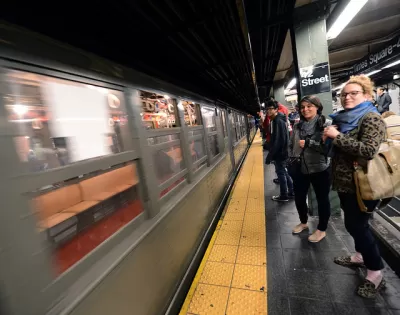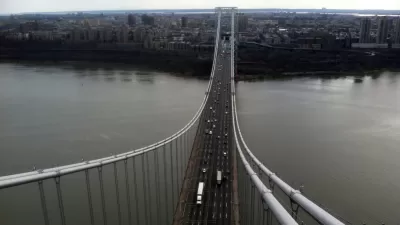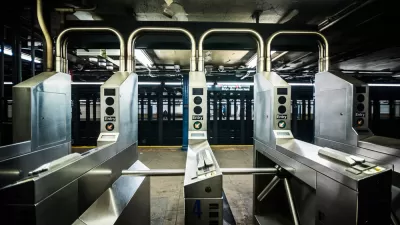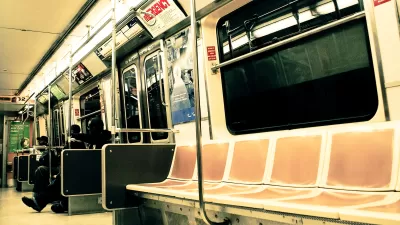Bernie Sanders may have retained his Brooklyn accent, but his knowledge of the subway seems to have stopped 13 years ago. And Chappaqua resident Hillary Clinton obviously hasn't ridden the subway in ages (if at all) based on her 'swiping' technique.

"Bernie Sanders forgot (or revealed that he never knew) that the subway token has long been replaced by a magnetic-swipe MetroCard, and Hillary Clinton had to swipe her card five times* before the turnstile let her in," writes John Raskin, executive director of the Riders Alliance, a grass-roots organization of subway and bus riders in New York City, in a New York Daily News op-ed.
Raskin writes that the subway faces serious challenges, such as "trains that never come, dangerously crowded platforms, mysterious 'train traffic ahead' announcements that keep us sitting in the tunnel for interminable minutes."
Our transit system is like a rock star with a drug problem — overwhelmingly popular but secretly on the verge of collapse. Close to 9 million people ride New York’s subway, bus and commuter rail on an average weekday, and our century-old system is starting to buckle under the strain.
Subway delays due to crowding have skyrocketed and trains have started to break down more often, heralding a slide back toward the bad old days of the 1970s and ’80s. C train cars date to the mid-1960s; many lines use signal technology introduced before World War II.
Planetizen has been following the electrical problems of two of the more modern U.S. subways: the Bay Area Rapid Transit system in northern California, which opened 1972, and Metro in the District of Columbia, which opened four years later. By comparison, the New York Subway, second oldest in the U.S. after Boston's, opened in 1904.
Seeing a nationwide trend, it’s appropriate to look to the federal government for help. And we have a rare opportunity: Leading presidential candidates from both parties are hopscotching across town this week, trying to sell themselves to New Yorkers. Amid all the talk about “New York values” and a looming New York debate, how about a little attention to New York’s pressing problems.
A recent Planetizen post did look at transportation policies of four presidential candidates. While the two Democrats were supportive of increased infrastructure spending, two of the leading Republicans were clearly not of the same mind.
Starting with Senator Ted Cruz, [Next City's Daniel] McGraw notes that the Tea Party favorite has promised to kill funding for the New Starts Transit Program and has already voted against the FAST Act—the first multi-year transportation funding bill passed by Congress since 2005. By contract, Donald Trump has "expressed more than once what seems like jealousy of other countries’ 'super-speed trains'" and has stated, albeit vaguely, that the United States should spend more on mass transit.
Raskin also references the MTA's growing capital deficit despite an approved capital plan. Meanwhile, Gov. Andrew Cuomo's 'wish list' for new, big-ticket projects continues to grow.
*Hillary is certainly not alone in encountering "Swipe Again At This Turnstile,” after a bad swipe, which is one of the reasons why the subway payment system will eventually transition from a "swipe to a tap", writes Emma G. Fitzsimmons for The New York Times. As for tokens, they went out of service in 2003.

Planetizen Federal Action Tracker
A weekly monitor of how Trump’s orders and actions are impacting planners and planning in America.

Restaurant Patios Were a Pandemic Win — Why Were They so Hard to Keep?
Social distancing requirements and changes in travel patterns prompted cities to pilot new uses for street and sidewalk space. Then it got complicated.

Map: Where Senate Republicans Want to Sell Your Public Lands
For public land advocates, the Senate Republicans’ proposal to sell millions of acres of public land in the West is “the biggest fight of their careers.”

Maui's Vacation Rental Debate Turns Ugly
Verbal attacks, misinformation campaigns and fistfights plague a high-stakes debate to convert thousands of vacation rentals into long-term housing.

San Francisco Suspends Traffic Calming Amidst Record Deaths
Citing “a challenging fiscal landscape,” the city will cease the program on the heels of 42 traffic deaths, including 24 pedestrians.

California Homeless Arrests, Citations Spike After Ruling
An investigation reveals that anti-homeless actions increased up to 500% after Grants Pass v. Johnson — even in cities claiming no policy change.
Urban Design for Planners 1: Software Tools
This six-course series explores essential urban design concepts using open source software and equips planners with the tools they need to participate fully in the urban design process.
Planning for Universal Design
Learn the tools for implementing Universal Design in planning regulations.
Heyer Gruel & Associates PA
JM Goldson LLC
Custer County Colorado
City of Camden Redevelopment Agency
City of Astoria
Transportation Research & Education Center (TREC) at Portland State University
Camden Redevelopment Agency
City of Claremont
Municipality of Princeton (NJ)





























